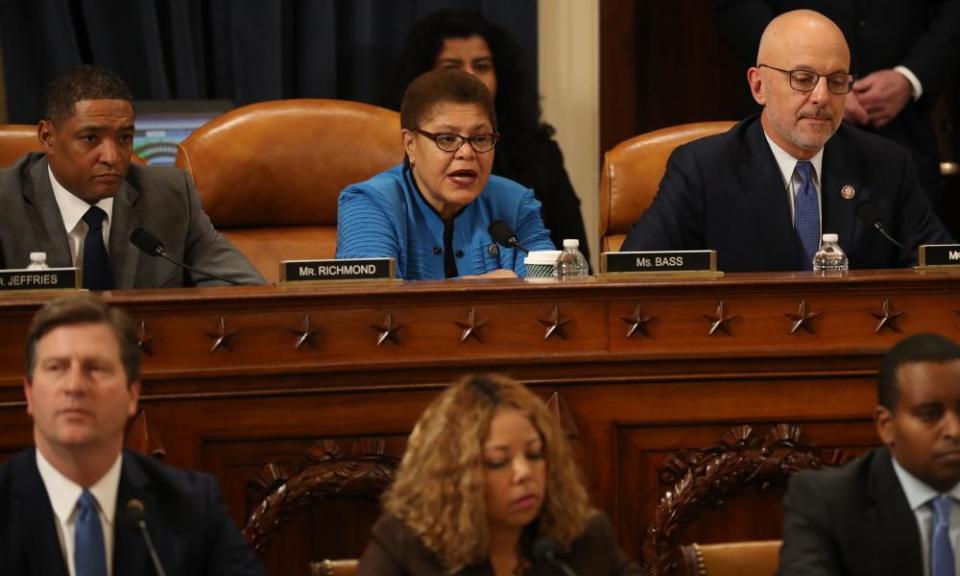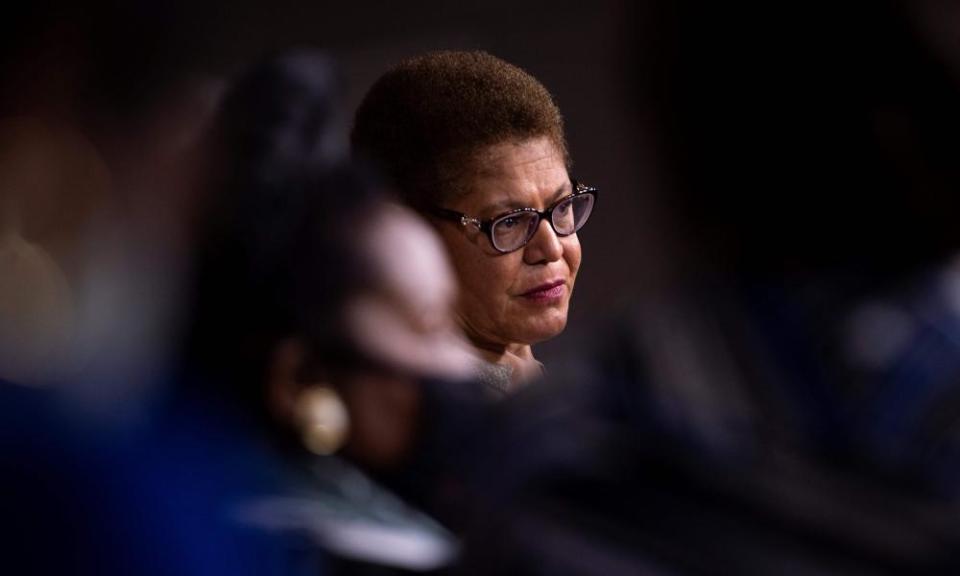Karen Bass: the progressive congresswoman who could be Biden's vice-president
In Karen Bass’ home state, colleagues across the political spectrum sing her praises.
Most of America is just getting to know the 66-year-old congresswoman from Los Angeles who in recent weeks emerged as a top contender to be Joe Biden’s vice-presidential running mate. But in California, Bass has built a reputation as a progressive and a pragmatist – a community organizer who fought police brutality and addiction in Los Angeles and a practical politician who helped dig the state out of a historical fiscal crisis in 2008.
Related: Sexism casts shadow over Biden's search for a female running mate
The congresswoman is “someone who can heal our country – not just from the pandemic, but also from the racial divisions, the economic divisions”, the legendary labor organizer Dolores Huerta told the Guardian.
Biden is expected to announce his running mate in the coming days. When the former vice-president earlier this year committed to choosing a woman to join his ticket, public speculation immediately coalesced around Kamala Harris, the California senator who ran against him in the Democratic presidential primaries. Buzz also circled Susan Rice, the Obama administration national security adviser, and Val Demmings, the Florida congresswoman. But in recent weeks, Californians who worked with Bass – including Huerta – have openly campaigned for her as vice-president, propelling her to the top of Biden’s shortlist.

Bass’ supporters commend her fierce commitment to advancing social justice, and an easy charm that has helped her win over liberals and staunch conservatives alike. But others worry her politics are too far to the left to appeal to moderate voters, as the vice-presidential vetting process resurfaced some of her political controversies – including past comments about the Cuban dictator Fidel Castro that could alienate expats in the political quagmire of Florida.
‘She builds coalitions’
Bass grew up in a Black, middle-class neighborhood Los Angeles, trained as a physician assistant and worked in an emergency room. As the crack epidemic hit LA, she began a substance abuse and treatment center – a non-profit that grew into the Community Coalition, which remains an influential advocacy group in the city.
At a time when the government moved to further criminalize drug possession and violently police Black and brown neighborhoods, Bass argued addiction was a public health crisis and advocated against the infamous 1994 “tough on crime” law that Biden helped write. She lobbied to replace liquor shops in South LA with housing and grocery stores, battled to build more schools and campaigned to keep children from being forced into foster care.
She won a seat in the California assembly in 2004 and was elected speaker of the assembly two years later, becoming the first Black woman to lead a state legislative house.
In the state capital, Sacramento, she found herself at the center of a wholly different kind of crisis. Republicans and Democrats had been locked in a months-long stalemate over how to address a $41m deficit in the aftermath of the Great Recession. “When Karen walked into the negotiations, it just changed the dynamics in the room,” said Mike Villines, who was the assembly’s Republican minority leader. “She would really listen to everybody, and at first – we even thought – is this a trick?”
Bass held firmly to her goals to minimize cuts to education and healthcare, said Darrell Steinberg, the mayor of Sacramento and the Democratic leader of the state senate at the time. “Yet she was also the epitome of ‘you can disagree strongly without being disagreeable,’” he said. Steinberg, Bass, Villines and their colleagues won a John F Kennedy Profiles in Courage award for the compromise they reached in February 2009.
The trust Bass built in Los Angeles and in Sacramento propelled her to Congress in 2010. She was elected to lead one of the most diverse districts in California – her constituency in Los Angeles is 25% white, 25% Black, 40% Latino and 8% Asian American. “At a moment when we need to help rebuild our country from crisis, Karen is a builder – she builds coalitions,” Huerta said.
Bass was elected chair of the Congressional Black Caucus in 2018. And in the aftermath of protests following the death of George Floyd, she is leading her party’s effort to reform the police, and, to an extent, reverse the legacy of Democratic policies that unequally incarcerated Black and brown Americans.

The George Floyd Justice in Policing Act she helped develop passed in Congress was backed by every Democratic representative and three Republicans. The bill, which is unlikely to be taken up by the Republican-led Senate, curbs “qualified immunity”, a legal provision that shields police. It makes lynching a federal crime, and incentivizes local police departments to ban chokeholds – but it doesn’t defund the police or direct resources away from law enforcement, as activists have long demanded.
“No, I don’t think it’s time to defund the police,” Bass told Fox LA, though she echoed an argument that many supporters of defunding make – that police shouldn’t be the ones responding to every type of emergency. When the government underfunds social programs and healthcare, “police are left to pick up the pieces, and that’s wrong”, she said. “They’re not social workers – why should they be dealing with social, economic and health problems.”
Bass and Biden
Though Biden’s views on policing have evolved since he spearheaded his crime bill, the duo’s politics still diverge significantly. She supports the ambitious Green New Deal to tackle the climate crisis, and Medicare for All as a solution to the nation’s healthcare woes. He prefers more moderate options.
But the two also have a lot in common personally, and philosophically. She, like him, was struck by tragedy early in her political career. In 2006, less than two years after she was inaugurated to the California state assembly, her 23-year old daughter, Emilia, and son-in-law Michael died in a car accident.
Bass has discussed the loss with Biden, whose wife and one-year-old daughter died in a car crash in 1972. “The most difficult part of that was – and it was the same with him – when those accidents happened, both of us were in public life,” Bass said in an interview with Ozy. “The world is watching you grieving.”
Like Biden, Bass said she struggled to “carry on” afterwards. “I began to understand how despair led people to just cash it in,” Biden wrote in his memoir about the period following his wife and daughter’s death. For Bass, it was the memory of her daughter that “allowed her to continue”, she said. “Because she would have been very upset with me if I didn’t continue.”
Both politicians also share a commitment to bipartisanship – a motivation or obligation to reach out to those they don’t agree with, and look for common values. The same way Biden’s supporters celebrate his goofball affability, Bass’ colleagues and friends praise her disarming charm. “You can put Karen anywhere, even in the most rightwing, ultra conservative district, and she’ll get some of the people there into conversation with them,” said Fabian Núñez, who was the California assembly speaker before Bass.
“She’s genuinely very, very nice,” Steinberg told the Guardian. “She’s good people.”
Villines, who remains a Republican, said that nonetheless “I would be very comfortable with Karen in high positions in government, because I know she absolutely is a real person who’s been through some really difficult things and who’s really just trying to get things done.”
Even the House minority leader, Kevin McCarthy – a Trump ally who shares almost no political common ground with progressive Bass – has called her his “favorite Democrat” for her ability to negotiate.

It may seem a remarkable contradiction then that progressives have openly endorsed Bass as a champion of “transformative change” who would give liberals a voice at the White House. “She knows where to hold the line,” Steinberg explained.
It may help to understand her to know that Bass earned brown belts in taekwondo and hapkido. “Remember those old Bruce Lee movies? When somebody who had watched a Bruce Lee movie would think they knew how to fight – with no discipline, no control – they would come in just flailing, swinging,” she told the LA Times in 2009. “You should have goals; it should be clear where the beginning, middle and end game is, and that’s what I felt I was taught.”
Public vetting
Bass’s political goals at the moment don’t seem to include an eventual run for president – and she says it never has. “You can look back in my life, and I think it’s pretty clear that I didn’t set out to run for president,’’ she said on NBC’s Meet the Press. “I have always been focused on work.”
Now that she is a top candidate for veep, her public vetting has been “a very interesting process; a trip down memory lane”, she joked. Her past work in Cuba has come under particular scrutiny.
In the 1970s, Bass worked for the Venceremos Brigade, a joint venture of Fidel Castro’s government and Students for a Democratic Society, the leftist, antiwar group in the US. Bass has said that she helped build housing and healthcare facilities with the group, to help the Cuban people. She’s also faced criticism for referring to Castro as “Comandante en Jefe” – a title that Cuban expats in the US denounce – when the dictator died in 2016, and for eulogizing Oneil Marion Cannon, a top member of the Communist Party USA as a “friend and mentor”.
Republicans have seized on an opportunity to paint Bass as a Castro supporter, and a communist, in particular to Cuban Americans in swing states like Florida. Bass argues her position on Cuba “is really no different than the position of the Obama administration”. She accompanied Obama in 2016 on his historic visit to the country. Bass has also stressed that she is not a communist, but said she appreciated Cannon’s work for his community in Los Angeles and his commitment to campaigning for Black and brown candidates.
Amid heightened scrutiny of her past, the Los Angeles Times also revealed that Bass has earned consulting fees from a community non-profit that she founded, and that her campaign had funded. Bass has maintained that her income and the campaign donations are unrelated, and the non-profit has corroborated her position.
Another concern for critics is Bass’ effusive speech at the 2010 opening of the Church of Scientology’s headquarters in LA, when she praised the group’s founder L Ron Hubbard. She told a crowd of 6,000, “your creed is a universal creed and one that speaks to all people everywhere”.
In a statement, Bass said she was looking for an “area of agreement” with the church, and in the decade since “published first-hand accounts in books, interviews and documentaries have exposed this group”. Scientology defectors have alleged intimidation, abuse and human trafficking. “Just so you all know, I proudly worship at First New Christian Fellowship Baptist Church in South LA,” Bass noted in her statement.
Huerta, who supported Kamala Harris in the presidential primaries, but recently published an op-ed endorsing Bass for vice-president said the discussions around the congresswoman’s have created a “fantasma” – a ghost or a boogeyman – “designed to frighten supporters”.
“It’s ridiculous,” she said “You have Donald Trump who praised the dictator in North Korea,” she said. When the president has failed to condemn, and even exalted leaders who have overseen humanitarian atrocities, Huerta said, “it’s silly” for Republicans to fixate on Bass’ record on Cuba.

 Yahoo News
Yahoo News 
